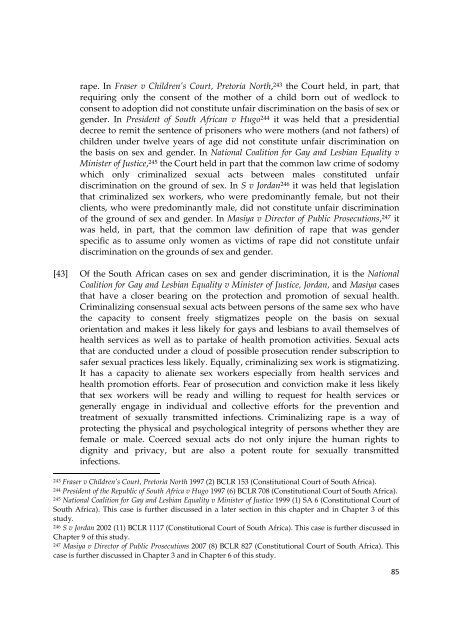sexual health and human rights in the african region - The ICHRP
sexual health and human rights in the african region - The ICHRP
sexual health and human rights in the african region - The ICHRP
Create successful ePaper yourself
Turn your PDF publications into a flip-book with our unique Google optimized e-Paper software.
ape. In Fraser v Children’s Court, Pretoria North, 243 <strong>the</strong> Court held, <strong>in</strong> part, that<br />
requir<strong>in</strong>g only <strong>the</strong> consent of <strong>the</strong> mo<strong>the</strong>r of a child born out of wedlock to<br />
consent to adoption did not constitute unfair discrim<strong>in</strong>ation on <strong>the</strong> basis of sex or<br />
gender. In President of South African v Hugo 244 it was held that a presidential<br />
decree to remit <strong>the</strong> sentence of prisoners who were mo<strong>the</strong>rs (<strong>and</strong> not fa<strong>the</strong>rs) of<br />
children under twelve years of age did not constitute unfair discrim<strong>in</strong>ation on<br />
<strong>the</strong> basis on sex <strong>and</strong> gender. In National Coalition for Gay <strong>and</strong> Lesbian Equality v<br />
M<strong>in</strong>ister of Justice, 245 <strong>the</strong> Court held <strong>in</strong> part that <strong>the</strong> common law crime of sodomy<br />
which only crim<strong>in</strong>alized <strong>sexual</strong> acts between males constituted unfair<br />
discrim<strong>in</strong>ation on <strong>the</strong> ground of sex. In S v Jordan 246 it was held that legislation<br />
that crim<strong>in</strong>alized sex workers, who were predom<strong>in</strong>antly female, but not <strong>the</strong>ir<br />
clients, who were predom<strong>in</strong>antly male, did not constitute unfair discrim<strong>in</strong>ation<br />
of <strong>the</strong> ground of sex <strong>and</strong> gender. In Masiya v Director of Public Prosecutions, 247 it<br />
was held, <strong>in</strong> part, that <strong>the</strong> common law def<strong>in</strong>ition of rape that was gender<br />
specific as to assume only women as victims of rape did not constitute unfair<br />
discrim<strong>in</strong>ation on <strong>the</strong> grounds of sex <strong>and</strong> gender.<br />
[43] Of <strong>the</strong> South African cases on sex <strong>and</strong> gender discrim<strong>in</strong>ation, it is <strong>the</strong> National<br />
Coalition for Gay <strong>and</strong> Lesbian Equality v M<strong>in</strong>ister of Justice, Jordan, <strong>and</strong> Masiya cases<br />
that have a closer bear<strong>in</strong>g on <strong>the</strong> protection <strong>and</strong> promotion of <strong>sexual</strong> <strong>health</strong>.<br />
Crim<strong>in</strong>aliz<strong>in</strong>g consensual <strong>sexual</strong> acts between persons of <strong>the</strong> same sex who have<br />
<strong>the</strong> capacity to consent freely stigmatizes people on <strong>the</strong> basis on <strong>sexual</strong><br />
orientation <strong>and</strong> makes it less likely for gays <strong>and</strong> lesbians to avail <strong>the</strong>mselves of<br />
<strong>health</strong> services as well as to partake of <strong>health</strong> promotion activities. Sexual acts<br />
that are conducted under a cloud of possible prosecution render subscription to<br />
safer <strong>sexual</strong> practices less likely. Equally, crim<strong>in</strong>aliz<strong>in</strong>g sex work is stigmatiz<strong>in</strong>g.<br />
It has a capacity to alienate sex workers especially from <strong>health</strong> services <strong>and</strong><br />
<strong>health</strong> promotion efforts. Fear of prosecution <strong>and</strong> conviction make it less likely<br />
that sex workers will be ready <strong>and</strong> will<strong>in</strong>g to request for <strong>health</strong> services or<br />
generally engage <strong>in</strong> <strong>in</strong>dividual <strong>and</strong> collective efforts for <strong>the</strong> prevention <strong>and</strong><br />
treatment of <strong>sexual</strong>ly transmitted <strong>in</strong>fections. Crim<strong>in</strong>aliz<strong>in</strong>g rape is a way of<br />
protect<strong>in</strong>g <strong>the</strong> physical <strong>and</strong> psychological <strong>in</strong>tegrity of persons whe<strong>the</strong>r <strong>the</strong>y are<br />
female or male. Coerced <strong>sexual</strong> acts do not only <strong>in</strong>jure <strong>the</strong> <strong>human</strong> <strong>rights</strong> to<br />
dignity <strong>and</strong> privacy, but are also a potent route for <strong>sexual</strong>ly transmitted<br />
<strong>in</strong>fections.<br />
243 Fraser v Children’s Court, Pretoria North 1997 (2) BCLR 153 (Constitutional Court of South Africa).<br />
244 President of <strong>the</strong> Republic of South Africa v Hugo 1997 (6) BCLR 708 (Constitutional Court of South Africa).<br />
245 National Coalition for Gay <strong>and</strong> Lesbian Equality v M<strong>in</strong>ister of Justice 1999 (1) SA 6 (Constitutional Court of<br />
South Africa). This case is fur<strong>the</strong>r discussed <strong>in</strong> a later section <strong>in</strong> this chapter <strong>and</strong> <strong>in</strong> Chapter 3 of this<br />
study.<br />
246 S v Jordan 2002 (11) BCLR 1117 (Constitutional Court of South Africa). This case is fur<strong>the</strong>r discussed <strong>in</strong><br />
Chapter 9 of this study.<br />
247 Masiya v Director of Public Prosecutions 2007 (8) BCLR 827 (Constitutional Court of South Africa). This<br />
case is fur<strong>the</strong>r discussed <strong>in</strong> Chapter 3 <strong>and</strong> <strong>in</strong> Chapter 6 of this study.<br />
85
















